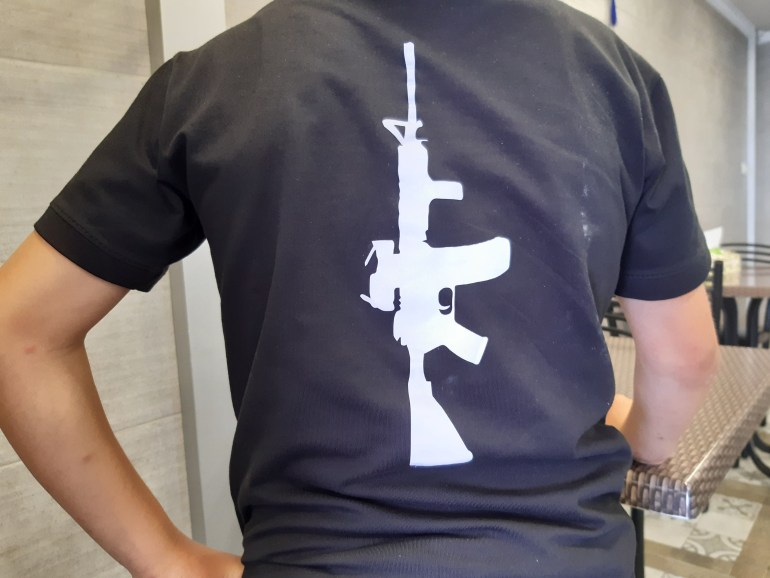Nablus
- "This child will not pass his shirt," shouted one of the Israeli occupation soldiers stationed at Tora military checkpoint near the town of Ya'bad in Jenin in the northern West Bank.
The Palestinians circulated the story of “Youssef’s shirt” widely on social media, especially that the target this time was a 3-year-old child, and the reason was his shirt, on which a picture of the M16 rifle was printed.
Yousef's family travels daily from their village "Tora" south of Jenin to work on their farm in the neighboring village of Umm al-Rihan, which is isolated by the apartheid wall within the Green Line, and an Israeli military checkpoint separates between the two villages.
Sanad Qabha, the father of the child Youssef, told Al Jazeera Net that the occupation soldiers, after they subjected his two children, Youssef (3 years) and Sila (6 years) and his wife to a search in a private room, ordered the little one to take off his shirt and stressed that he would not pass otherwise.
came back naked
The father continues that the soldiers, after forcing Youssef to take off his shirt, "refused the shirt to remain inside the vehicle, so his grandfather threw it outside to allow them to pass."
The child returned to his village, which is 3 kilometers away, "naked" accompanied by his family, "in a state of great fear and a very bad psychological situation for a defenseless child," says his father.
The father had bought a black T-shirt from the market in Jenin when he was with his child, who then insisted on buying it, "and he loved it so much that he clings to it, and that is why he kept crying after the soldiers forced him to take it off."
With the escalation of the occupation's targeting of Palestinian resistance fighters and the increase in the state of popular resistance in recent months in particular, T-shirts bearing the image of the "M16 rifle" have spread in the markets of the West Bank.
These shirts have become a fashionable garment that appeals to children and young men alike.
The drawing of the gun was later printed on other clothes such as trousers, hats and shoes.
Rebel gun
On a short tour of the market in the city of Nablus, also in the northern West Bank, you will find M16 shirts and dresses widely distributed, worn by young men or displayed by shops, and it has become a very popular “fashion”.
One of them appeared inside a shop while he and his wife were checking a shirt bearing a huge picture of the "M16" to match it and the pants he had bought for his son, while other young men were wearing it and wearing hats bearing the same drawing. "The M16 uniform has become a complete set," says Abdullah, who works in one Clothes stores downtown.
He adds to Al Jazeera Net that the demand for this outfit has increased with its different pieces (shirt, pants, shoes and hat), especially since it is not difficult to provide it, "these clothes are printed here on the West Bank and are not imported, and are not subject to obstacles."
Despite this, young Muhannad, who owns a shop specialized in selling male clothes, chose not to trade in these fashions when he heard that the occupation pursued them, prevented them and confiscated them.
The "M16" (American-made) is known locally as "the Palestinian revolutionary's rifle", and it appeared more as a companion to his struggle against the occupation in the second intifada, and they sometimes call it the "Samra" with which the occupation sleeps.
Perhaps the appearance of Palestinian resistance fighters in the West Bank armed with this rifle in their clashes with the occupation, and in the rallies of resistance cells, has a role in the influence of young men on their appearance, and in their attempt to imitate them or show their support for the armed resistance.
Perhaps the emergence of the Palestinian resistance with this rifle has a role in the influence of the young men and their attempt to imitate them (Al-Jazeera)
'ridiculous behaviour'
Karim Jubran, a researcher at the Israeli human rights organization B'Tselem, considers the occupation soldiers' pursuit of clothing a "legal and moral violation."
He says that chasing children in this dress is "ridiculous" behavior and reflects the "lack of morals" of the Israeli soldiers, and "reflects the disdain for the Palestinian and considering him a second-class human being."
According to Jubran, the occupation is fighting a slogan or a drawing of a weapon on Palestinian shirts, while settlers and their children are allowed to carry this weapon and roam around with it.
The communication sites were buzzing with the story of Youssef and his shirt, and the tweeters conveyed the event and the picture amid a state of resentment at the behavior of the occupation soldiers with the child.
Activist Fadi Elyan wrote, "The soldiers forced Youssef to take off his shirt and had to return to his home naked. An army of shame and reproach."
As for Abdel Rahim Barkawi, he wrote, after re-publishing the news, "One of the latest bouts of racist hysteria for the indomitable army!"
chasing shirts
The Israeli media dealt with the story of the "M16" shirts, and the journalist Gideon Levy wrote in the Haaretz newspaper, "The last cry of those under the occupation is the fashion for the M16 shirt, and the last cry of the occupier is the prohibition of fashion."
Levy said that Israeli police had already raided Palestinian stores and confiscated T-shirts with a gun motif.
And he added sarcastically, "The checks at the checkpoints will be stricter than ever, and they will include underwear for fear that there is an M-16 hidden inside, and if it is discovered to be out of fashion, it will be immediately confiscated and burned in an oven that is built at each checkpoint."

